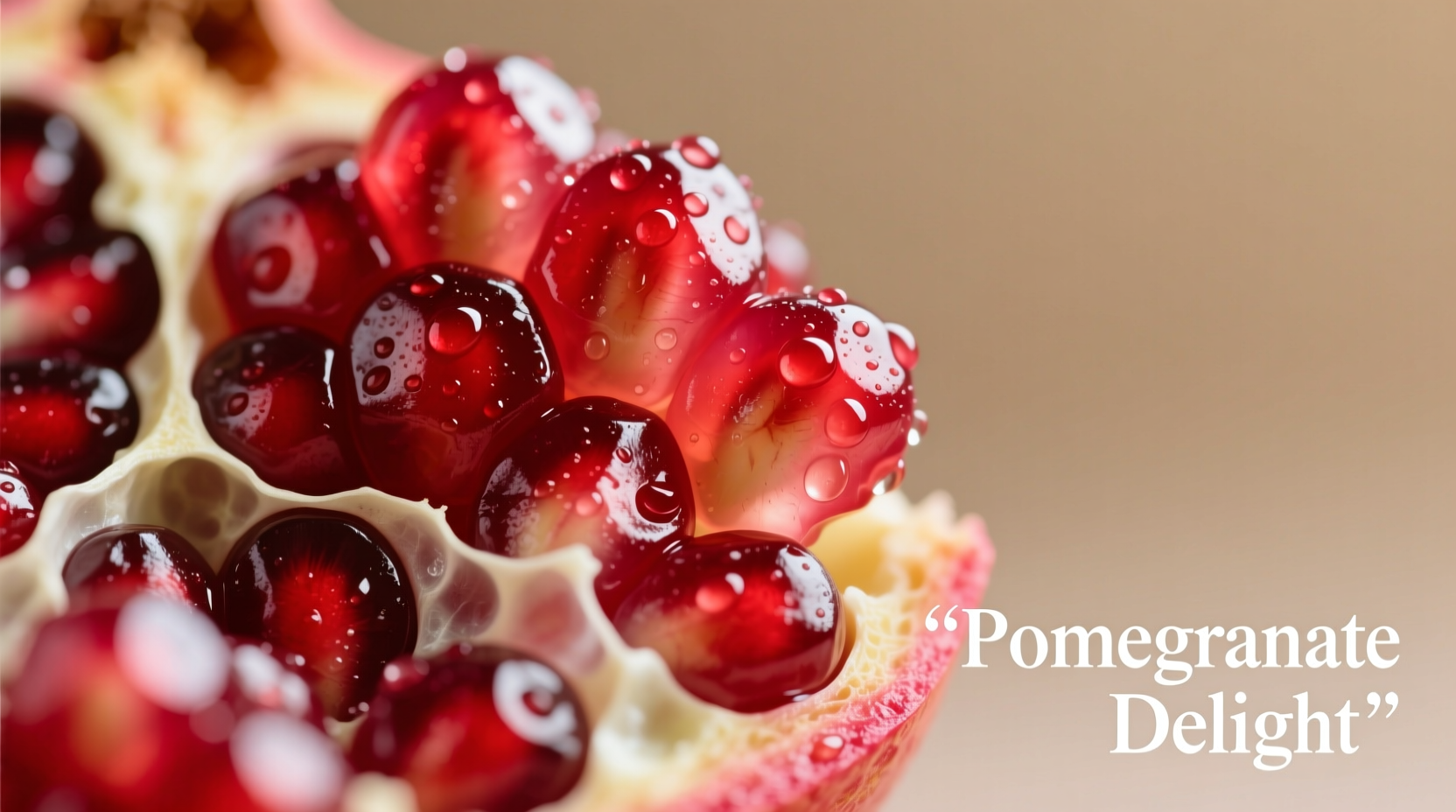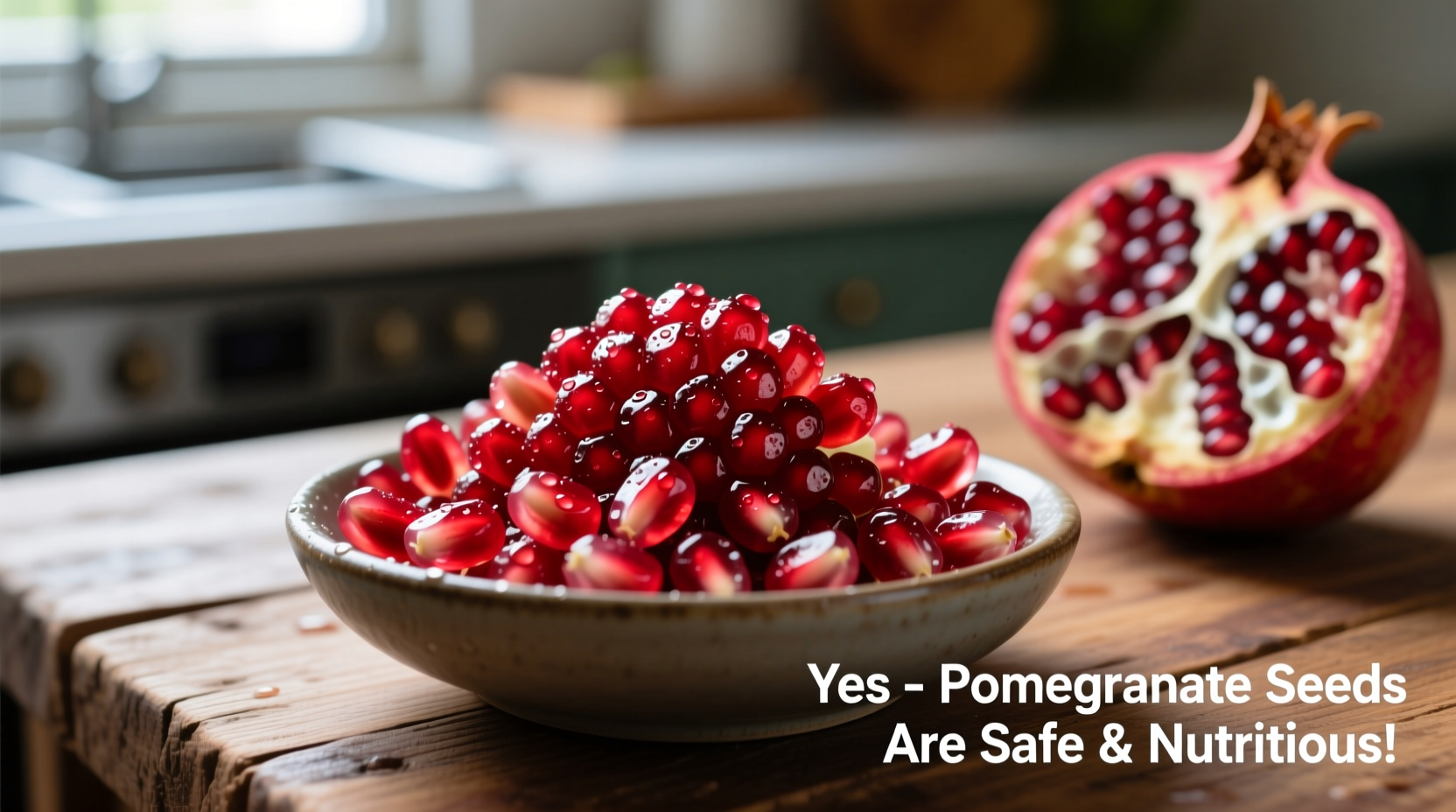Many people wonder whether they should spit out pomegranate seeds like cherry pits or swallow them whole. Unlike some fruit seeds that contain harmful compounds, pomegranate seeds (Punica granatum) pose no toxicity risk and actually contribute valuable dietary fiber and polyphenols to your nutrition profile. This complete guide examines the science behind pomegranate seed consumption, addressing common concerns while highlighting their impressive health advantages.
Understanding Pomegranate Anatomy
Before addressing safety, it's helpful to understand pomegranate structure. What we commonly call "pomegranate seeds" are technically arils - each consisting of:
- Outer sac: Juicy, vitamin-rich membrane (the part most people enjoy)
- Inner seed: Crunchy, edible kernel (often mistakenly considered inedible)
Unlike apple or cherry seeds that contain cyanogenic compounds, pomegranate seeds contain no toxic substances. The entire aril is designed by nature to be consumed, aiding in seed dispersal through animal digestion.
Nutritional Powerhouse: Why You Should Eat the Seeds
The crunchy seed portion provides significant nutritional value often missed when people discard them. Consider these key benefits:
| Nutrient | Per 100g Seeds | Health Benefit |
|---|---|---|
| Dietary Fiber | 13.7g | Supports digestive health and satiety |
| Polyphenols | High concentration | Potent antioxidants fighting cellular damage |
| Punicic Acid | 65-80% of fat content | Conjugated linolenic acid supporting heart health |
| Vitamin K | 16mcg (20% DV) | Essential for blood clotting and bone metabolism |
Data sourced from USDA FoodData Central confirms that pomegranate seeds contain three times more fiber than the juice alone. Research published in the Journal of Agricultural and Food Chemistry demonstrates that the seed's hard outer layer actually protects beneficial compounds during digestion, allowing them to reach the colon where they provide maximum anti-inflammatory effects.
Safety Considerations and Proper Consumption
While pomegranate seeds are safe for most people, certain considerations apply:
Digestive Tolerance
The high fiber content (13.7g per 100g) means some people may experience mild digestive effects when first incorporating seeds regularly. Registered dietitians at Mayo Clinic recommend:
- Start with small portions (1/4 cup)
- Gradually increase to allow digestive system adaptation
- Drink adequate water to support fiber processing
Choking Hazard Awareness
For young children under 4 years old, the small, hard seeds present a potential choking risk. The American Academy of Pediatrics advises parents to either:
- Remove seeds when serving to toddlers
- Lightly crush seeds before serving
- Supervise closely during consumption
Dental Considerations
While the seeds themselves won't damage teeth, pomegranate juice's acidity (pH 2.9-3.2) can affect enamel. The American Dental Association recommends:
- Rinse mouth with water after consumption
- Avoid brushing immediately after eating
- Consume as part of a meal rather than alone
How to Maximize Benefits While Eating Pomegranate Seeds
Professional chefs and nutritionists recommend these techniques for optimal enjoyment and nutrient absorption:
Proper Extraction Method
To preserve seed integrity and prevent juice loss:
- Cut pomegranate in half horizontally
- Submerge in bowl of water
- Gently loosen arils with fingers
- Seeds will sink while membrane floats
- Strain and enjoy whole arils
Culinary Applications
Don't limit yourself to eating pomegranate seeds raw. Culinary experts suggest:
- Add to salads for crunch and color contrast
- Blend into smoothies (seeds provide texture)
- Use as topping for Greek yogurt or oatmeal
- Incorporate into grain pilafs for festive presentation
- Press seeds lightly to release some juice while retaining crunch

Who Should Exercise Caution
While safe for most, certain populations should consult healthcare providers before regular consumption:
Medication Interactions
According to research from the National Institutes of Health, pomegranate compounds may interact with:
- ACE inhibitors (blood pressure medications)
- Statins (cholesterol medications)
- Certain blood thinners
The American Heart Association notes that while interactions are rare, those on these medications should discuss pomegranate consumption with their doctor.
Digestive Conditions
Individuals with certain digestive conditions may need to modify consumption:
- Irritable Bowel Syndrome (IBS): May trigger symptoms during flare-ups
- Inflammatory Bowel Disease (IBD): Consult gastroenterologist during active phases
- Diverticulitis history: Some doctors recommend seed avoidance
Debunking Common Myths
Several misconceptions persist about pomegranate seeds:
Myth: Seeds cause intestinal blockage
Fact: No documented cases exist of pomegranate seeds causing intestinal obstruction in healthy adults. The seeds' small size (2-4mm) and fibrous nature actually support healthy digestion. This myth likely confuses pomegranate seeds with larger, harder pits like those from stone fruits.
Myth: Only the juice has health benefits
Fact: Research from the University of California shows the seed kernel contains higher concentrations of punicic acid and fiber than the juice. Discarding seeds means losing up to 40% of the fruit's total antioxidant capacity.
Conclusion: Embrace the Whole Aril
Pomegranate seeds are not only safe to eat but represent a nutritional powerhouse worth incorporating into your diet. By consuming the entire aril - both juicy sac and crunchy seed - you maximize fiber intake, antioxidant exposure, and heart-healthy fats. Start with moderate portions to assess tolerance, use proper extraction techniques to enjoy maximum freshness, and consult your healthcare provider if you have specific medical conditions or take medications that might interact.
Frequently Asked Questions
Can you digest pomegranate seeds properly?
Yes, pomegranate seeds are fully digestible for most people. The crunchy outer layer provides valuable insoluble fiber that supports healthy digestion. While the seed kernel passes through your system largely intact, it delivers beneficial compounds to your colon where gut bacteria can utilize them. Some people with sensitive digestive systems may experience mild gas or bloating initially, but this typically resolves with regular consumption.
How many pomegranate seeds should you eat daily?
Most nutritionists recommend 1/2 to 1 cup of pomegranate arils (including seeds) daily for optimal benefits without digestive discomfort. This provides approximately 3-6 grams of fiber, 200-400mg of polyphenols, and significant antioxidant activity. Start with smaller portions (1/4 cup) if you're new to eating the seeds, then gradually increase as your digestive system adapts to the additional fiber.
Do pomegranate seeds help with weight loss?
Pomegranate seeds can support weight management through several mechanisms. Their high fiber content (13.7g per 100g) promotes satiety and reduces overall calorie intake. The crunchy texture requires more chewing, which can slow eating pace and improve fullness signals. Research published in Nutrition Journal shows that pomegranate polyphenols may help regulate fat metabolism, though they should be part of an overall balanced diet rather than considered a standalone weight loss solution.
Can you eat pomegranate seeds if you have diverticulosis?
Current medical guidance has evolved on this topic. The American Gastroenterological Association now states that pomegranate seeds (2-4mm size) are generally safe for people with diverticulosis. Unlike larger seeds or nuts, pomegranate seeds are small enough to pass through the digestive tract without becoming trapped in diverticula. However, if you've recently experienced a diverticulitis flare-up, consult your gastroenterologist about when to reintroduce high-fiber foods like pomegranate seeds.
Are dried pomegranate seeds as healthy as fresh ones?
Dried pomegranate seeds retain most nutritional benefits but with some important differences. The drying process concentrates sugars and calories (approximately 300kcal per 100g dried vs 83kcal fresh), while preserving fiber and antioxidant content. Some heat-sensitive vitamins like vitamin C decrease during drying. For maximum benefit, choose freeze-dried over oven-dried varieties, which better preserve delicate compounds. Dried seeds make excellent portable snacks but should be consumed in smaller portions due to higher calorie density.











 浙公网安备
33010002000092号
浙公网安备
33010002000092号 浙B2-20120091-4
浙B2-20120091-4